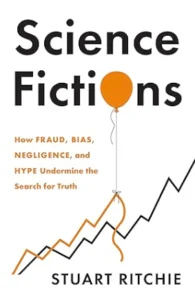Science is often held as the gold standard of truth—a methodical, rigorous pursuit of knowledge that guides everything from medicine to policymaking. But what if the very system designed to uncover objective reality is itself compromised? Stuart Ritchie’s book, Science Fictions: How Fraud, Bias, Negligence, and Hype Undermine the Search for Truth, dives deep into the cracks forming within modern research. It reveals how systemic pressures, human errors, and even outright deception distort the scientific process, leading to unreliable results that shape public perception and decision-making.

For anyone who has placed their trust in peer-reviewed research or relied on scientific findings to make informed choices, Ritchie’s work is both a wake-up call and a guide to understanding why science sometimes fails. This review explores his key arguments, examines the broader implications of his findings, and considers whether the solutions he proposes can truly mend science’s credibility crisis.
When Science Gets It Wrong
Science is supposed to be self-correcting, a process where bad ideas are weeded out through rigorous scrutiny. But as Ritchie argues, the system has fundamental weaknesses that allow flawed studies to slip through the cracks—sometimes with devastating consequences.
One of the most pressing issues is the replication crisis. Across various disciplines, from psychology to medicine, researchers have struggled to reproduce the results of landmark studies. A large-scale replication effort in psychology, for example, found that only 39% of studies could be successfully replicated. In medical science, flawed studies can mislead clinicians, affecting patient care and even endangering lives.
Ritchie outlines four major culprits undermining scientific integrity:
- Fraud: Intentional data fabrication or manipulation.
- Bias: Researchers’ unconscious leanings that shape results.
- Negligence: Sloppy methodologies and careless errors.
- Hype: Overstated claims exaggerated by the media.
While fraud represents the most extreme form of misconduct, it is surprisingly common. High-profile cases, such as that of Paolo Macchiarini—a surgeon who faked research on artificial windpipes, leading to patient deaths—illustrate how severe the consequences can be when bad science goes unchecked.
The Replication Crisis: A Scientific House of Cards
The replication crisis is more than just an inconvenience; it shakes the foundation of evidence-based decision-making. When a study claims that a new drug improves survival rates or that a psychological intervention boosts productivity, we assume these claims are built on solid ground. But Ritchie’s research suggests otherwise.
One of the biggest problems is p-hacking, a practice where researchers manipulate statistical methods to make results appear more significant than they actually are. By tweaking data or selectively reporting only favorable outcomes, studies can create the illusion of strong evidence when the reality is much murkier.
Additionally, the publish-or-perish culture in academia encourages researchers to prioritize quantity over quality. Universities and funding agencies reward researchers for publishing frequently, leading many to churn out papers that lack depth, rigor, or meaningful conclusions. As a result, groundbreaking findings may be based on shaky evidence, and negative or inconclusive results often go unpublished—a phenomenon known as publication bias.
Bias and Negligence: The Invisible Hands Distorting Science
Not all scientific failures stem from outright fraud. Many stem from biases—often unconscious ones—that skew research results. Ritchie details how confirmation bias (the tendency to favor information that aligns with existing beliefs) influences everything from study design to data interpretation.
Consider nutrition science. For decades, researchers have debated the health effects of saturated fats, sugar, and processed foods. Yet conflicting studies and shifting dietary guidelines have left the public confused. Why? Often, researchers inadvertently design studies that reinforce their existing theories, ignoring contradictory evidence or downplaying inconvenient findings.
Negligence, too, plays a significant role. Many studies suffer from flawed methodologies, small sample sizes, or a lack of proper controls. Ritchie describes how even reputable journals sometimes fail to catch glaring errors, allowing low-quality research to enter the scientific record.
Media Hype: When Sensationalism Trumps Accuracy
Even when scientists conduct rigorous research, their findings can be distorted by media hype. News outlets thrive on eye-catching headlines, often exaggerating scientific claims to attract attention. A study that finds a weak correlation between a particular diet and longevity might be sensationalized as “The Secret to Living 100 Years!”
One of Ritchie’s key examples is Matthew Walker’s bestselling book Why We Sleep, which claims that inadequate sleep is the root cause of numerous health problems. While sleep is undoubtedly important, critics have pointed out that Walker’s work contains several errors and overstated claims. Yet, because the book was widely publicized, its conclusions have been treated as established fact, influencing public discourse and even health policies.
Ritchie argues that this pattern is common: journalists amplify dramatic findings, while researchers—eager for recognition—may oversell their work, creating a cycle where hype outweighs truth.
Can Science Be Fixed?
Despite its flaws, Ritchie believes that science is worth saving. He proposes several reforms to restore trust in research:
- Pre-registration of studies: By requiring scientists to register their hypotheses and methodologies before conducting experiments, the risk of p-hacking and selective reporting could be reduced.
- Mandatory data sharing: Making raw data publicly available would allow other researchers to verify findings, promoting transparency.
- Reforming peer review: Introducing more rigorous and independent review processes could help catch errors before flawed studies are published.
- Shifting incentives: Rewarding quality over quantity in academic publishing could discourage the rush to produce superficial research.
Some of these changes are already gaining traction. The Center for Open Science and similar initiatives advocate for transparency and reproducibility in research. However, implementing widespread reform remains a challenge, especially in a system where institutional inertia and competitive pressures resist change.
Final Thoughts: A Critical but Hopeful Outlook
Ritchie’s Science Fictions is a must-read for anyone invested in the credibility of science. It sheds light on the hidden mechanisms that shape research outcomes, exposing how flawed studies can mislead the public, waste resources, and, in some cases, cause real harm.
At times, the book leans toward pessimism. While Ritchie convincingly lays out the problems, some critics argue that he underestimates ongoing efforts to address these issues. The Open Science movement, stricter guidelines for statistical analyses, and increased awareness of bias are already making strides toward a more reliable research landscape.
Still, the book serves an important function: it challenges us to scrutinize scientific claims more carefully, demand transparency, and advocate for a system that prioritizes truth over sensationalism. Whether you’re a researcher, student, journalist, or simply a curious reader, understanding these issues is crucial for navigating a world increasingly shaped by scientific findings.
The next time you encounter a bold scientific claim, take a moment to ask: How was this study conducted? Who funded it? Has it been replicated? In a world awash with information, critical thinking is our best defense against misinformation—scientific or otherwise.

